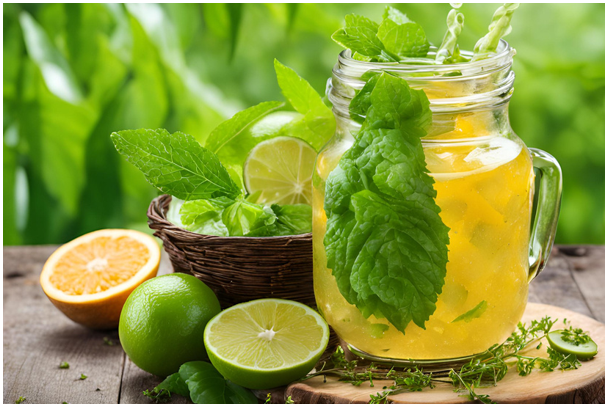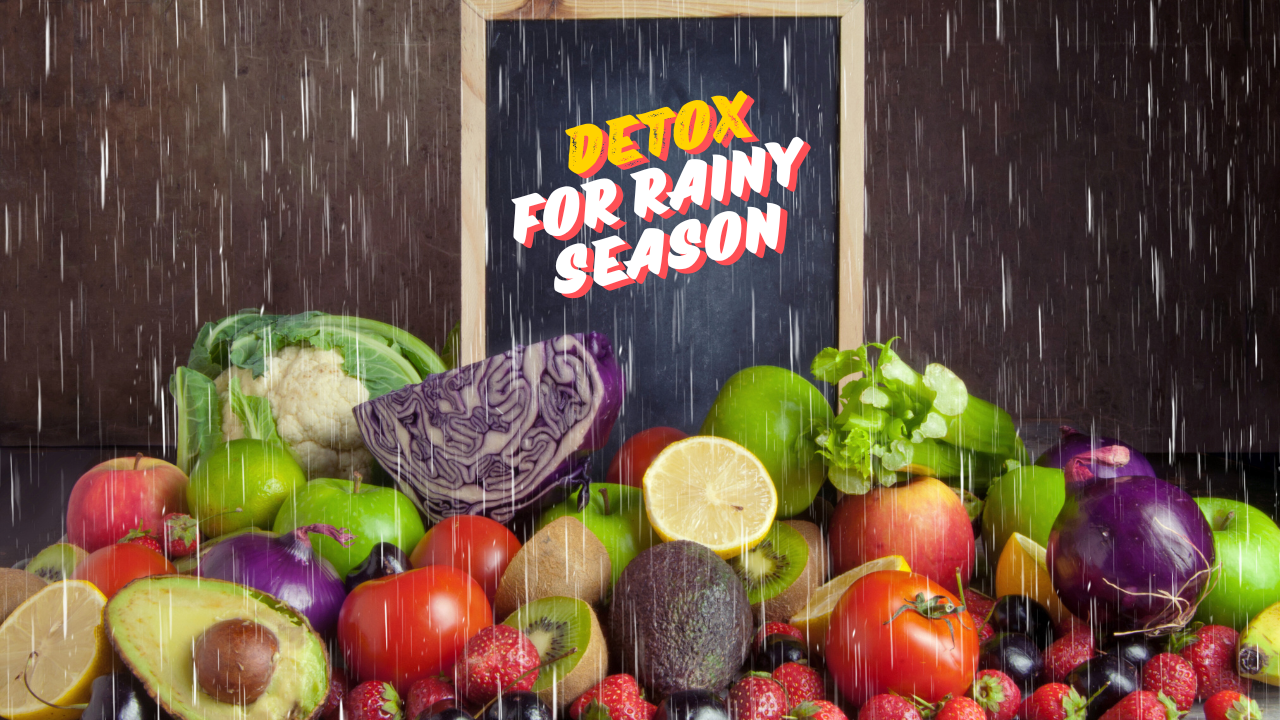DETOX:FOR RAINY SEASON
Detox for the Rainy Season: An Essential Guide

As the rainy season sets in, it’s crucial to adapt our health strategies to combat the unique challenges this time of year brings. This period often sees a rise in certain diseases and health issues due to increased humidity and changes in weather. In this article, we will delve into effective detox strategies specifically designed for the rainy season. We will explore common illnesses associated with this time of year, the significance of detoxing, and methods for boosting immunity and managing digestive health. Additionally, we’ll examine various detox therapies including dietary adjustments, treatments, fasting techniques, and recommended remedies to help you stay healthy and vibrant throughout the rainy season.
Why Detox During the Monsoon?
The rainy season presents unique challenges due to high humidity and fluctuating temperatures. Humidity creates a favorable environment for the growth of microbes such as viruses, bacteria, and fungi, which can lead to various diseases. Given that this season increases the likelihood of infections, it’s essential to detoxify and boost our immunity to stay healthy.
Common Diseases in the Rainy Season
- Viral Diseases: With the onset of rain, common worries include the risk of cold and flu, particularly for children. These viral infections thrive in humid conditions and can cause symptoms like fever, sore throat, cough, and body aches.
- Waterborne Diseases: The rainy season often leads to water contamination due to broken pipes and stagnant water. This can cause cholera, which presents as severe diarrhea, abdominal pain, and fever. Typhoid is another waterborne disease that becomes prevalent during this time.
- Vector-Borne Diseases: Mosquitoes are major vectors for diseases such as dengue fever and malaria. Dengue causes high fever, joint pain, and skin rashes, while malaria results in fever, chills, and fatigue.
- Fungal Infections: Increased humidity can lead to fungal infections like athlete’s foot, ringworm, and other skin infections. These conditions are often exacerbated by the prolonged dampness of clothing and skin.
- Digestive Disorders: Food poisoning and gastroenteritis are common due to contaminated food. Bacteria and microorganisms proliferate in the humid environment, leading to symptoms like loose motions, vomiting, and overall digestive discomfort.
The Importance of Detox
Detoxifying during the rainy season is crucial for several reasons:
- Boosting Immunity: Enhancing your immune system helps in fighting off infections and prevents illnesses associated with the monsoon.
- Cleansing the Body: Even though our bodies have natural detoxification systems, factors like poor digestion and environmental pollution can impair these processes. Detoxification helps in supporting and enhancing the body’s natural cleansing abilities.
- Improving Digestion: Effective detoxing improves digestion, which aids in better nutrient absorption, reduces bloating, and maintains overall health.
- Reducing Inflammation: Proper detoxification helps in reducing inflammation caused by bacterial or viral infections, preventing adverse effects on the body.
How to Detox Effectively
- Enhance Immunity: Incorporate foods and practices that strengthen your immune system. This includes consuming immune-boosting foods, maintaining good hygiene, and staying hydrated.
- Cleanse the Body: Focus on eating foods that support the liver and kidneys, which are crucial for detoxification. Drink plenty of water and avoid processed foods.
- Improve Digestion: Eat fiber-rich foods, avoid heavy and greasy meals, and stay hydrated to support digestive health.
- Manage Inflammation: Include anti-inflammatory foods in your diet, such as turmeric, ginger, and green leafy vegetables.
Boosting Immunity and Detoxification During the Rainy Season

To effectively boost immunity and support detoxification during the rainy season, it is crucial to focus on certain dietary practices and natural remedies. Here’s how you can enhance your immune system and promote a healthy detox process.
Boosting Immunity
- Vitamin C-Rich Foods: Consuming foods rich in Vitamin C is essential for boosting immunity. Citrus fruits like oranges and lemons are excellent sources of Vitamin C. While grapefruits may be less available, guava and kiwi are great alternatives, both being rich in Vitamin C. Additionally, amla (Indian gooseberry) is a highly effective source of Vitamin C. You can consume amla juice or amla powder. It is generally recommended to drink amla juice before meals rather than on an empty stomach.
- Probiotics: Incorporating probiotics into your diet can improve digestion and enhance gut health, which in turn supports immunity. Probiotics can be found in yogurt, fresh curd, and fermented foods like kimchi and sauerkraut. These foods contain beneficial bacteria that help balance gut flora and boost your immune response.
- Ginger and Garlic: Both ginger and garlic have immune-boosting properties and can be used in various ways. You can add them to your vegetables or consume their extracts. Their natural anti-inflammatory and antibacterial properties make them valuable additions to your diet, especially during the monsoon season.
- Herbal Teas: Herbal teas such as green tea, echinacea tea, and chamomile tea can enhance immune function and provide a soothing effect. These teas are rich in antioxidants and other compounds that support overall health.
- Zinc-Rich Foods: Incorporating nuts, seeds, and legumes into your diet can provide essential zinc, which is crucial for maintaining a healthy immune system.
- Turmeric: Known for its anti-inflammatory and antioxidant properties, turmeric contains curcumin, which can help reduce inflammation and support overall health.
Detoxification
- Fiber-Rich Foods: The first step in effective detoxification is to include fiber-rich foods in your diet. Dietary fiber helps regulate digestion and maintain healthy intestinal activity. Fiber can be categorized into soluble and insoluble types, both of which aid in preventing constipation and promoting regular bowel movements.
- Diet Regulation: During the rainy season, it’s important to regulate your diet and avoid heavy, greasy foods. While fasting can be beneficial for detoxification, it should be done with caution and for a limited period. Over-fasting or consuming heavy meals after fasting can lead to digestive issues. Ensuring a balanced diet that supports digestive health is crucial during detoxification.
- Hydration and Cleansing: Staying hydrated and consuming herbal teas can aid in body cleansing. Proper hydration supports kidney function and helps flush out toxins from the body.
Enhancing Health During the Rainy Season: The Role of Nuts, Turmeric, and Diet

During the rainy season, maintaining a balanced diet rich in essential nutrients is crucial for overall health. Here’s a closer look at the benefits of incorporating nuts and turmeric into your diet, and how to optimize your nutrition during this period.
Nuts: A Nutrient-Rich Choice
Nuts are an excellent source of zinc, an essential mineral that supports various bodily functions, including immune health. They are also rich in other nutrients necessary for maintaining good health. While nuts are beneficial, it’s important to consume them in moderation, especially if you have a sensitive digestive system. Start with small quantities and gradually increase as your digestion improves. Nuts are particularly beneficial for skin health due to their rich nutrient profile. Including them in your diet can help maintain skin health and overall well-being.
Turmeric: The Golden Spice
Turmeric, a popular spice in many Indian diets, is known for its powerful anti-inflammatory and antioxidant properties, primarily due to a compound called curcumin. Consuming turmeric in various forms, such as golden milk (turmeric milk) or incorporating it into your dishes, can offer significant health benefits. For those who follow a traditional Indian diet, the use of turmeric is quite common. However, focusing on its health benefits and ensuring its inclusion in your diet can further enhance its positive effects.
If you are already consuming turmeric through your regular diet, such as in curries or other dishes, additional consumption of turmeric milk may not be necessary. However, if you want to boost its effects, adding turmeric milk occasionally can be beneficial. The traditional Indian diet often includes these health-promoting spices, making it a natural choice for supporting health during the rainy season.
Dietary Considerations
For those following an Indian diet, many of the foods that are naturally included offer significant health benefits. Despite this, it’s essential to focus on incorporating nutrient-rich foods, such as nuts and turmeric, to ensure a well-rounded diet that supports health during the monsoon.
Managing Digestion and Detoxification During the Rainy Season

The rainy season brings a unique set of challenges for digestion and overall health. Addressing common issues such as bloating, gas, and diarrhea requires attention to diet and hygiene. Here’s how you can manage these problems effectively:
Addressing Digestion Problems
Bloating and gas are common digestive issues that can be alleviated by improving digestion. Ensuring good digestive health helps prevent these problems from arising. Diarrhea, often caused by waterborne diseases or contaminated food, can be managed by maintaining proper hygiene. Make sure to use clean water, whether filtered or not, and ensure that the storage containers are properly decontaminated.
Avoid consuming contaminated or improperly prepared food, especially from external sources. Preparing food at home can help maintain hygiene and avoid digestive issues. If you prefer oily foods or snacks like pakoras, consume them in moderation and plan your meals accordingly. It’s best to consume such foods when your digestion is optimal, based on your personal digestion pattern, whether it is in the morning, at lunchtime, or in the evening.
Acidity during the rainy season can often be attributed to stress and erratic eating patterns. Maintaining a regular eating schedule helps the body anticipate food intake, reducing digestive discomfort and acidity.
Detoxification and Nutrition
Detoxification is essential during the rainy season, and incorporating green juices into your diet can provide excellent nutrition. Spinach, available throughout the season, is a good choice for detoxification. However, ensure you wash leafy vegetables thoroughly to remove dirt and contaminants. Soaking them in baking soda or hot water can help clean them effectively.
Incorporate vegetables like bitter gourd and fenugreek, which aid in liver detoxification. Fenugreek seeds, soaked overnight, can be a useful addition to your detox regimen. Fruits like apples, pears, and papayas are high in fiber and help improve digestion. Boiling apples or steaming them can aid those with weak digestion.
Whole grains, such as brown rice, quinoa, and oats, provide essential fiber and support digestive health. Individuals with weak digestion should avoid raw foods initially and focus on strengthening digestion before incorporating raw items. Dairy products may cause issues for some, so consider avoiding them if necessary.
Detox Treatments
Steam Therapy: Steam therapy is a popular detox method that helps open up pores and expel toxins through sweat. Given the high humidity during the rainy season, steam therapy can be beneficial in removing salts and toxins from the body. Steam also helps in reducing acne and other skin issues prevalent during this time.
Dry Powder Massage: This technique involves using specific powders for massage, which is particularly beneficial for conditions like arthritis, joint pain, or body pain. Triphala powder is a good option for such massages. Dry powder massage helps in removing toxins from specific areas, such as joints, and can be beneficial for individuals with high levels of toxins in the body.
Essential Oils: Incorporating essential oils like lavender can be advantageous. Lavender oil not only boosts immunity but also reduces stress and muscle tension. Using lavender oil can help relax muscles and alleviate internal stress, providing overall comfort.
Fasting as a Detoxification Method

Fasting is an important aspect of detoxification and can be an effective way to improve health. We have previously discussed methods like steam therapy and dry powder massage; now, let’s explore fasting, particularly intermittent fasting and juice fasting, and their benefits.
Intermittent Fasting
- Purpose: Intermittent fasting helps improve metabolic function by providing breaks between food intake. These breaks allow the body to rest and enhance its metabolic processes.
- Benefits: Encourages mindful eating, improves digestion, and supports overall health. It is effective throughout the year, not just during the monsoon season.
- Implementation: Consider incorporating light meals for three days and then a day of juice fasting. This can be adjusted based on individual health conditions.
- Cultural Practice: Traditional practices, such as eating once a day during the Sawan month, align with intermittent fasting principles. These practices may help reduce exposure to bacteria and viruses prevalent in the evening.
- Seasonal Considerations: During the monsoon season, when lethargy and sluggishness are common, reducing food intake to one meal a day or following intermittent fasting can be beneficial.
Juice Fasting
- Purpose: Juice fasting involves consuming fresh vegetable juices to aid detoxification. Different vegetables serve specific functions for various organs.
- Benefits: Provides essential nutrients and aids in detoxification. Juice fasting can be integrated into a regular detox plan.
- Implementation: A common approach is to alternate between light meals and juice fasting. Adjust the frequency based on individual health needs and conditions.
Preparing for Fasting
- Preparation: The body needs to be properly prepared for fasting to avoid adverse reactions like loose motions, vomiting, or other complications.
- Medical Consultation: Seek medical advice if complications arise during fasting, such as headaches or increased acidity. Proper guidance helps prevent these issues from worsening.
- Planning: Develop a well-thought-out fasting plan and consider individual health needs to achieve the best results. Fasting should be approached with careful planning and preparation.
Detox Drinks and Dietary Planning for Effective Detoxification

Detoxification is essential for maintaining health and well-being, and incorporating detox drinks into your routine can significantly aid this process. Here’s a guide on various detox drinks and how to create a balanced diet plan for effective detoxification.
Detox Drinks:
- Lemon Water:
- Benefits: Lemon water is a popular detox drink known for its cleansing properties. It can be consumed with or without salt.
- Usage: Drinking lemon water on an empty stomach can enhance detoxification. If you’re not consuming food, stick to warm water throughout the day.
- Herbal Infusions:
- Examples: Ginger tea, turmeric tea, and mint tea are excellent choices for detoxification.
- Usage: These can be consumed on an empty stomach and are effective in detoxifying the body.
- Juice Fasting:
- Benefits: Juice fasting involves consuming fresh vegetable juices, which aid in detoxification. Each vegetable targets different organs.
- Usage: You can alternate between juice fasting and light meals. For instance, follow a three-day light meal plan with one day of juice fasting.
- Apple Cider Vinegar:
- Benefits: A modern tool in detoxification, apple cider vinegar offers numerous health benefits.
- Usage: Consume on an empty stomach for constipation issues, or 15 to 20 minutes before meals for other health benefits.
- Aloe Vera Juice:
- Benefits: Aloe vera juice is known for its cleansing properties and can aid in addressing nutritional deficiencies.
- Usage: It is particularly useful before apple cider vinegar or green juice if you prefer aloe vera juice over green options.
Detox Diet Plan
- Morning Routine:
- Start with Warm Lemon Water: Begin your day with warm lemon water, unless you have acidity issues, in which case, limit lemon to one or two drops in warm water.
- Breakfast: Opt for green smoothies or nut milk with a fruit, or start with moong water if you have digestion issues or protein deficiencies.
- Mid-Morning:
- Herbal Tea: A cup of herbal tea, such as ginger tea, can be consumed if you haven’t had your morning elements.
- Lunch:
- Light Meal: Keep lunch light with vegetable soup and whole grain bread or chapati. Choose old wheat flour or alternatives like jowar or bajra if wheat is to be avoided.
- Fresh Salad: Include fresh salad with leafy vegetables and use olive oil or coconut oil for dressing.
- Afternoon Snacks:
- Fruits: Consume apples, berries, or seasonal fruits like plums.
- Dinner:
- Options: For dinner, steam vegetables or opt for grilled fish. If non-vegetarian, grilled fish is a better option compared to other types of non-veg. Alternatives include soybean, tofu, or paneer.
- Additional Considerations:
- Milk: If you consume milk and it suits you, you can have it with turmeric or as green tea before bed. Avoid milk if it causes any medical issues.
Additional Tips
- Planning: Create a detailed plan for detox, including activities such as steam massages, pranayama, and meditation to enhance the detox process.
- Preparation: Ensure your body is prepared for detoxification to avoid adverse reactions. Consult medical professionals if you experience complications like headaches or digestive issues.
A Holistic Approach to Detoxification and Monsoon Health

As the monsoon season approaches, it’s crucial to adapt our detoxification strategies and daily routines to maintain health and prevent issues such as fungal infections and respiratory problems. Here’s a comprehensive guide to detoxification with a focus on both physical and mental well-being, especially during the monsoon.
Preventing Fungal Infections at Home
- Avoid Chemical Cleaners:
- Concerns: Bleaching powders are commonly used for cleaning but can be harmful to health. Instead, opt for natural cleaners to maintain a safe environment.
- Proper Drying:
- Clothes and Footwear: Ensure that clothes are thoroughly dried after washing to prevent fungal growth. Wet shoes and slippers should be dried completely before use.
- Common Sense Practices: These simple steps can prevent fungal infections and contribute to overall hygiene.
- Foot Care:
- Socks and Footwear: If patients have cuts or wounds on their feet, advise them to avoid wearing socks, as it may exacerbate the issue. Addressing such small details can be very beneficial.
Mental Detoxification
Acceptance of Seasonal Changes:
- Mental Adjustment: Embrace and accept the monsoon season to improve mental resilience. Negative attitudes towards seasonal changes can weaken the immune system, making you more susceptible to infections like colds and flu.
- Personal Experience: Accepting the monsoon mentally can alleviate related health issues and enhance overall well-being.
Effective Detoxification Strategies
- Hydration:
- Importance: Keeping the body well-hydrated is crucial. Proper water intake can also aid in alleviating symptoms of common colds and coughs.
- General Advice: Drinking sufficient water helps in detoxifying the body naturally.
- Listening to Your Body:
- Body Needs: Pay attention to your body’s signals and needs. This involves adjusting your diet according to seasonal changes and personal health conditions.
- Balancing Doshas: Recognize and balance your body’s doshas according to natural principles to support effective detoxification.
- Understanding Detoxification:
- Natural Detox: While detox juices and powders are available, naturopathy focuses on maintaining the body in a state where it can detoxify itself naturally.
- Practical Approach: Ensure that your body remains hydrated and balanced to naturally manage detoxification processes.
Building Immunity
Holistic Health:
- Strengthening Immunity: Instead of blaming diseases, focus on strengthening the immune system to prevent illnesses. Effective detoxification and a balanced diet contribute to better immunity.
- Detox Benefits: Proper detoxification helps in preparing the body for seasonal changes and boosts overall immune function.
In summary, effective detoxification and health management during the monsoon involve a combination of maintaining a clean environment, proper hydration, mental resilience, and listening to your body’s needs. By adopting these practices, you can enhance your well-being and better cope with the challenges of the monsoon season.








